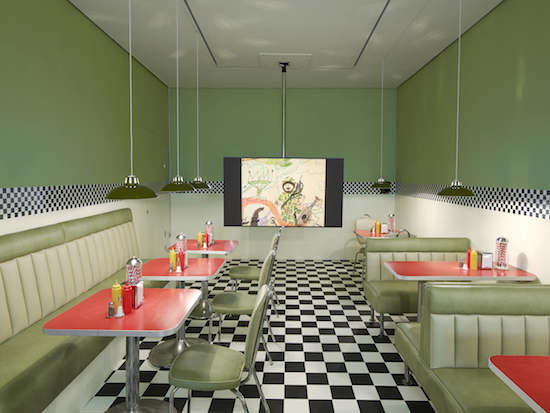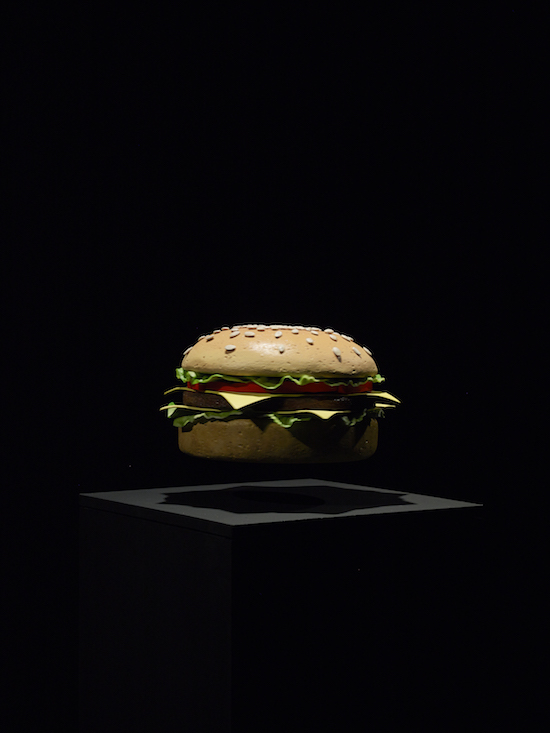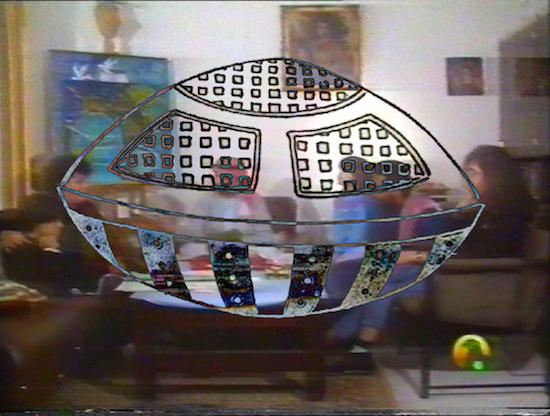In 1988, Monira Al Qadiri had a dream. In her dream, she saw her mother “go inside a spaceship,” as she told me the other week, “and my sister followed her there, and inside the space station was an American diner.” The peculiar thing was that on that same night, he sister, Fatima, had exactly the same dream. As a result, she says, “for the longest time – because it was an identical dream – we thought it was real.”
She was five years-old at the time, living in Kuwait. Her father worked as a diplomat for the Kuwaiti government. So in a very real sense, her parents really were communing with alien powers on a daily basis. In her short film, The Craft, in which she relates a semi-fictionalised version of this story, we see Al Qadiri père in old grainy VHS footage, going to work in an embassy building that even looks like a UFO. “We started being suspicious of what my parents were doing at the time,” Al Qadiri recalls. “This whole embassy-diplomat thing just turned into this alien conspiracy.”
Edited together from old home movies and newly shot VHS footage, displayed on a video monitor hanging from the ceiling in a mock-up of a classic 1950s American diner, all checkerboard tiles and green formica, The Craft is the centrepiece of Al Qadiri’s new exhibition at Gasworks in South London. It is a striking work, equal parts memoire, fantasy and science fiction film, which reimagines the last thirty years of Gulf history as a succession of alien invasions – which, in a way, must have been quite a lot like how it felt. Aside from anything else, as Al Qadiri says, “being a woman from Kuwait is not easy. There is always this feeling of wanting to escape.”
“But also,” she continues, “as a Kuwaiti you always have to think of a plan b, in case the oil collapses tomorrow, because the country is 90% dependent on oil, and we’re surrounded by all these bigger countries and – as we were shown in 1990 – we could be invaded overnight and turned into another country. I think everyone, in the back of their minds, has a plan to try to leave this place and build a life for themselves somewhere else.”
The curious thing about The Craft, though, is that it’s also a sort of origin story – in the Marvel comics sense. After her dream about seeing her parents enter an alien spaceship, Al Qadiri starts to draw and paint strange alien creatures – little green men and bug-eyed monsters. We seem in the film, superimposed, like brightly coloured watermarks, over old family home movies. In fact, these are her very earliest works as a visual artist. It was the first step towards the career she has today.

As a teenager, Al Qadiri left home to study in Japan, eventually receiving her PhD from the department of intermedia arts at Tokyo University in 2010, with a thesis on the aesthetics of sadness in middle eastern culture. In 2013, she was a founder member – along with her sister, electronic music artist Fatima Al Qadiri, plus Nanu Al Hamad, Khalid Al Gharaballi, Sophia Al Maria, Aziz Al Qatami, Barrak Alzaid, and Amal Khalaf – of the art collective GCC.
The group, whose members all have family connections to the Gulf states Kuwait, Qatar, and Bahrain, and whose name is a reference to the supranational Gulf Cooperation Council, have since exhibited at Project Native Informant in London, MoMA PS1 in New York, Art Basel Miami Beach, and the Sultan Gallery in Kuwait. “I think it was very sexy to be a collective from the Gulf,” Al Qadiri says. “That’s never happened before. So immediately we had shows all over the world and it suddenly just snowballed into this thing – much faster than any of us had anticipated.”
From the beginning, the GCC has been concerned primarily with what Al Qadiri describes as “the aesthetics of government”. They hold summits, make replicas of ministerial furnishings – gold fridges, ornate tables – and other trappings of the state, publish glossy images of themselves dressed ash sheiks shaking hands, produce videos pitched somewhere between advertising speak and political broadcast. They act, in effect, as “a government in drag”.
GCC has also been associated with the notion of a specific kind of “Gulf Futurism”, a term coined by writer and GCC member Sophia Al Maria to describe the way the region’s oil-driven modernity has forced “glass and steel against wool and camels”. But I’m curious how the futuristic imagery in Monira Al Qadiri’s film – and the GCC’s pose as a “government in drag” – might relate to the afrofuturism of Sun Ra, the alien drag of George Clinton.
“For me,” Al Qadiri says, “the fact that I am a chicken nugget and the fact that I went to Japan for ten years and then I came back to Kuwait, I’ve also been an alien myself. I have no cultural belonging to anywhere on earth. This alienness is a very prevalent theme in my life and I want to show it in a way – but it’s also about what popular culture does to you as a human being. In some ways, I feel like Kuwait is kind of a company that can go bankrupt at any given moment. Being an employee of that company, you can always get fired. So I guess this floating around the world is part of this maybe, this science fiction thing, to make it more palatable – for myself as well.”

The “chicken nugget” thing may take some explaining. “I went to a British school in Kuwait at a time when this kind of thing was prestigious,” Al Qadiri says. “We were actually called ‘chicken nuggets’. This was our name.” she laughs, shaking her head. “We were brown on the outside, white on the inside. We’re very westernised. We speak English better than Arabic.”
In a sense, the whole Gasworks show is Al Qadiri’s “ode to being a chicken nugget”, from the American diner and flying saucer imagery to the oversized hamburger in the next room, floating above a plinth. “As someone from Kuwait, it’s kind of taboo to admit to your own westernisation,” Al Qadiri says, “but I want to kind of confront it now.” The hamburger, then, comes across like some bizarre lost relic, a religious icon from some strange and mysterious tribe – the Americans! “The hamburger really became symbolic of American cultural expansion in the 1960s,” Al Qadiri explains, “– that’s when it was cemented. But now, all of this – the high summer of the post-war boom – looks very obsolete and almost alien – like the Invasion of the Body Snatchers. It doesn’t really feel like part of our lives anymore.”
“It’s always easy to critique the American influence on the world,” she continues, “imperialism and things like that. But I want to also show that I am complicit in it – and we all are. We took part in this junk food frenzy of capitalism. We were all a part of it.”
Monira Al Qadiri, The Craft, is at Gasworks, London, until 10 September 2017


